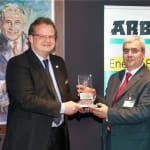 As a company devoted to energy efficiency in thought and action, Arburg annually bestows an award to a customer who places particular emphasis on energy efficiency in its philosophy and activities.
As a company devoted to energy efficiency in thought and action, Arburg annually bestows an award to a customer who places particular emphasis on energy efficiency in its philosophy and activities. On 22 March 2011, the LEGO Group was delighted to receive the Arburg Energy Efficiency Award, which has become firmly established and well recognised within the sector. During a ceremony, the award was presented to a high-ranking delegation from the Danish company.
In keeping with the special occasion, a seven-strong delegation from the LEGO Group travelled to Lossburg in order to receive the Arburg Energy Efficiency Award. Members included Bali Padda, Executive Vice President Supply Chain of the LEGO Group, Michael McNulty, Vice President Global Procurement LEGO Production, and John Hansen, Vice President Quality & Engineering LEGO Group.
On behalf of the LEGO Group, Bali Padda received the Arburg Energy Efficiency Award 2011 from the hands of Michael Hehl, Managing Partner and Spokesman for the Arburg Management Team, at a ceremonial evening event.

Michael Hehl thanked the recipient of the award for the long and trusting cooperation and joint developments: “For us, it is important that, like ourselves, the recipient of the award takes a holistic and innovative approach to the subject of energy efficiency. Because for us, potential savings in energy consumption also play a primary role in all areas of our company and have been a significant consideration in all developments and investments over a period of decades.
The invited guests included Ulrich Reifenhäuser, Chairman of the Association for Plastics and Rubber Machinery within the VDMA. He congratulated the winner and, as befitted the occasion, spoke on the interrelationships between energy supply, energy consumption and energy efficiency.
In his laudatory speech, Helmut Heinson, Managing Director Sales at Arburg described the co-operation with over the past 40 years: “The LEGO Group has been and remains one of our most demanding customers. Over the years, we have learned a great deal from one another and many of our product innovations have been initiated by our shared dreams and visions." He went on to say that, particularly in the field of energy efficiency, new joint projects and machine generations are being developed and will continue to be in the future. Arburg, he added, is in a position to make an important contribution to the “Planet Promise” activities of the LEGO Group, which is far more than simply a marketing campaign or a mere token gesture. It much rather represents an earnest commitment with regard to future generations in the form of specific programmes and measures. It is against the backdrop of these impressive activities and achievements that the Arburg Award committee unanimously decided to present this year’s Energy Efficiency Award to the LEGO Group.
Bali Padda thanked Arburg for the award. It was with great delight that the LEGO Group and he personally accepted it. He added that it was seen as an incentive to initiate further decisive and lasting steps towards an energy efficient corporate policy for the forthcoming generations. This, he said, could only be achieved with partners who think and work along the same lines with equal commitment. During the past decades, Arburg has been seen to always have made every effort and shown great willingness to support the LEGO Group over the long term in this regard. With partners such as this, concluded Padda, the company would achieve all its ambitious goals and even exceed them.
In order to produce the highly precise moulded bricks, which have been mutually compatible world-wide since 1958 to this day, with the greatest accuracy in large volumes, the LEGO Group has long used Arburg as a machine supplier. Over the years, numerous joint developments in the injection moulding sector have therefore focused not only on precision, but also on energy efficiency.
In 2007, the LEGO Group introduced its energy and environmental management system, which has yielded demonstrable successes: between 2007 and 2010, energy efficiency has been increased by 35%. Until 2015, this is to be improved by 5% annually. The impressive objective for 2020 is the 100% procurement of energy from renewable sources – worldwide.



